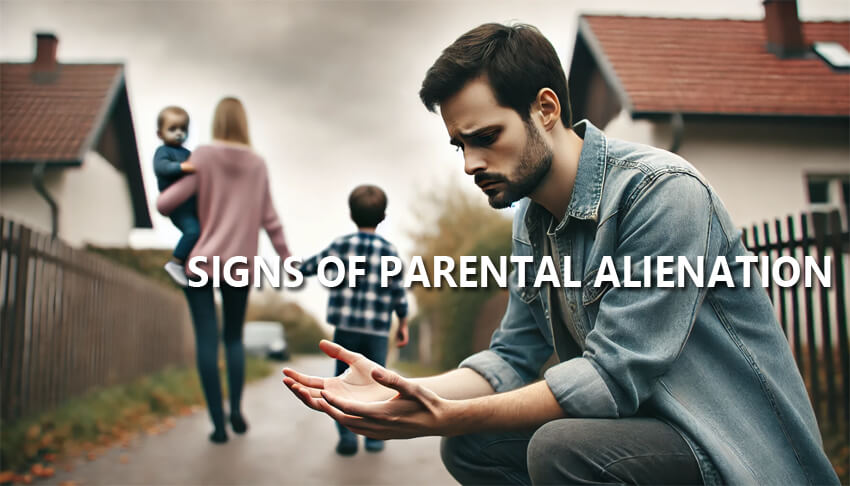As a father, you may already be going through the emotional difficulty of a divorce. Still, when your child suddenly starts acting distant, angry, or even outright rejecting you, the pain can feel unbearable. If this behavior seems to come out of nowhere, you might be dealing with parental alienation. It’s a situation where one parent negatively influences a child’s perception of the other parent, often leading to the child developing unjustified hostility toward you.

Below are 10 common signs of parental alienation to help you understand what may be happening and identify whether this is a concern in your situation.
1. Your Child Suddenly Rejects You Without Explanation
Sudden Withdrawal, Negative Language, Unexplained Rejection
One of the most heartbreaking parental alienation symptoms is when your child, who once had a good relationship with you, suddenly doesn’t want to spend time with you anymore. This rejection might not make sense, and you ask, “Why does my child suddenly reject me?”

Example: A father who had a solid bond with his child saw an abrupt change in behavior when his child suddenly refused to attend scheduled visits, with no clear reason given. Later, it became evident that the other parent had been making comments like, “Daddy doesn’t really care,” which eventually led to the rejection.
2. Unexplained Anger or Fear Toward You
Irrational Fear, Overreaction, Perceived Danger
If your child suddenly expresses unexplained anger towards you or begins acting fearful, and there’s no clear reason, it’s another red flag. It’s painful to see your child avoid you, especially when you know you’ve done nothing to deserve it. Often, this can happen due to psychological control or manipulation from the other parent.

Example: A child who had always been comfortable with his father began saying he was scared to be alone with him, despite no previous incidents to justify this fear. The child’s behavior was traced back to the mother’s comments, planting the idea that the father was “dangerous” or “untrustworthy.”
3. Your Child Parrots the Alienating Parent’s Grievances
Repeated Adult Concepts, Mirroring Grievances, Unsupported Negative Views
Have you noticed your child repeating negative things about you, using language or ideas they wouldn’t typically express? This parroting could indicate that the other parent is feeding your child certain narratives. It might make you wonder, “Why does my child mirror the alienating parent’s grievances?” This behavior is a key sign that your child is being influenced.

Example: A young child started saying things like, “You never take me anywhere fun,” or “You always cancel plans,” echoing the mother’s complaints. These complaints were repeated almost word for word despite the child having never expressed such feelings before.
4. Your Child Exaggerates Your Faults
Lack of Empathy, Justification of Rejection, No Appreciation for Positive Past
Everyone makes mistakes as a parent, but if your child starts exaggerating your faults—even turning minor incidents into major criticisms—this could be another sign of parental alienation. Your child may start vilifying you, making it seem like you’re always in the wrong, which could reflect the alienating parent’s influence.

Example: A father was shocked when his child began accusing him of “always being late” and “never listening,” despite these claims being untrue or greatly exaggerated. It became clear that the child had been encouraged to magnify these faults after hearing repeated criticism from the other parent.
5. Refusal of Contact or Visitation
Resistance to Visits, Avoidance Excuses, Superficial Cooperation
Perhaps one of the clearest signs of alienation is when your child outright refuses to visit or spend time with you. Refusal of contact can occur even when you’ve always had a loving relationship. If this happens frequently, it’s worth exploring the possibility of alienation. A common question arises: “What causes children to refuse visitation with one parent?” Often, the cause lies in emotional or psychological manipulation.

Example: A father was devastated when his child refused to come for court-ordered visitation without any real explanation. The other parent said, “You don’t have to go if you don’t want to,” encouraging the child to break contact with the father.
6. Polarization: Idealizing One Parent, Vilifying the Other
Idealization of One Parent, Vilification of the Other, No Balanced Perspective
Your child may start seeing the world in black and white regarding you and their other parent. They might idealize the alienating parent as perfect while vilifying you. This extreme polarization of parents is a hallmark sign of alienation. It’s a defense mechanism that allows the child to align with one parent to avoid conflict or confusion.

Example: In one case, the child began speaking about their mother as if she could do no wrong, while every minor misstep from the father was blown out of proportion. The father’s attempts to engage with the child were criticized, while the mother was viewed as flawless, a clear sign of parental polarization.
7. Personality Changes and Hostility
Blaming Minor Incidents, Amplifying Flaws, Unwillingness to Forgive
Another sign of parental alienation is a sudden and unexplained personality change in your child, especially if they start acting hostile or cold toward you. This change might be subtle initially, but it can lead to complete emotional distancing over time. If your child was once warm and loving but barely speaks to you, it’s a noteworthy symptom.

Example: A father noticed that his once affectionate child became distant and hostile, often refusing to engage in conversation. The child had started hearing things like, “Your dad only cares about his work,” from the mother, leading to feelings of neglect and resentment.
8. Siblings Also Rejecting You
Sibling Rejection Patterns, Influence from Friends, External Reinforcement of Alienation
Sometimes, it’s not just one child—siblings may also begin rejecting you. Sibling influence plays a significant role here, as children may mirror each other’s behavior and align themselves with the alienating parent. You may wonder, “Does parental alienation affect siblings the same way?” Unfortunately, it often does, creating a unified front against the alienated parent.

Example: Two siblings, after spending time with their mother, both began rejecting their father, even though the relationship had been strong before. The siblings influenced each other, reinforcing their rejection of the father, largely driven by comments and attitudes they picked up from their mother.
9. Lack of Empathy Towards You
Complete Alignment, Rigid Good vs Bad Views
It can be extremely hurtful if your child starts showing a lack of empathy toward your feelings. They may not care if you’re upset, sad, or frustrated. This emotional distancing often happens because the child has been conditioned to view you negatively. This behavior results from parent-child relationship dynamics being manipulated by the other parent.

Example: A father was visibly emotional during visits because of his child’s cold behavior. Despite seeing his father upset, the child showed no concern or emotion, reflecting how deeply the alienating parent’s manipulation had taken hold.
10. Behavioral Changes After Contact with the Alienating Parent
Demeanor Shift, Mood Swings, Disinterest in Activities
Finally, you might notice that your child’s behavior changes dramatically after being with the other parent. For example, they may return from a visit and seem angry or distant, even if things are fine. These behavior changes can result from the alienating parent’s subtle or overt influence over the child during their time together. This shift in behavior is one of the clear ways parental alienation manifests.

Example: A father noticed that after visits with the mother, his child became withdrawn and wouldn’t speak much, even though they were happy and open before the visit. This behavior change occurred every time the child returned from their mother’s house, indicating alienating tactics were likely at play.
What Can You Do?
Recognizing these signs early is important. You may be asking, “Can parental alienation be reversed?” The answer is yes, but it requires legal and emotional support. If you suspect parental alienation, it’s crucial to consult with a divorce attorney who has experience in these cases. They can help you protect your rights and rebuild your relationship with your child.

The legal process can be tough, but remember, you’re not alone. Understanding these signs is the first step, and with the right help, you can fight to maintain your bond with your child.


